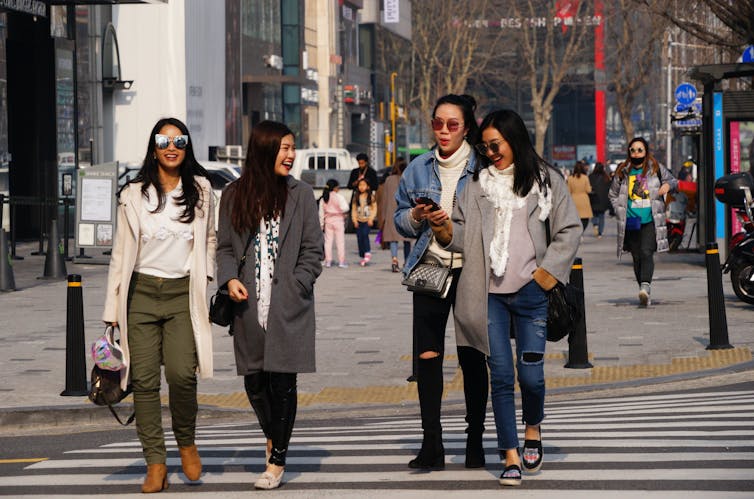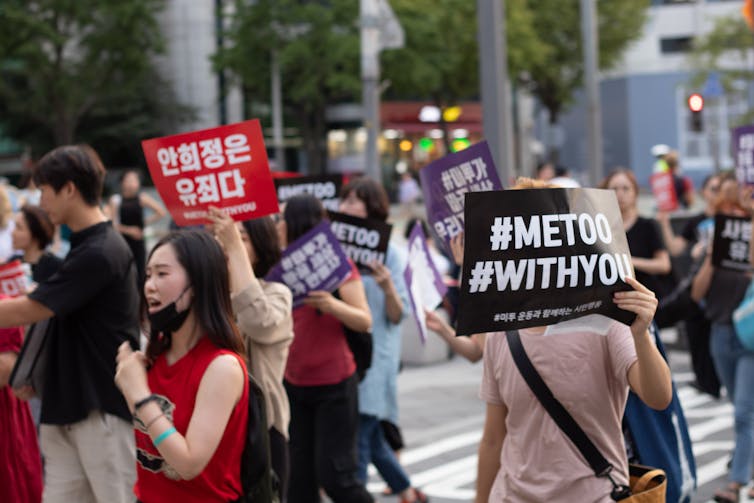
Youngmi Kim, University of Edinburgh
Donald Trump’s return to the White House has sparked fears about the future for women’s rights in the US. Trump has a long history of misogyny and has boasted about his role in shaping the court that overturned women’s constitutional right to an abortion in 2022. His victory thus, unsurprisingly, sparked a reaction.
Following November’s election, some American women encouraged each other to delete dating apps, sign up for self-defence classes, and get on birth control. Others drew attention to 4B, a radical feminist movement founded in South Korea that has seen some women refuse to marry, have children, engage in romance, or participate in sexual relationships with men.
The movement, which first came about in the 2010s as a response to the misogyny that is pervasive across South Korean society, went viral on social media in the aftermath of Trump’s election, especially in the US. It takes its name from its four defining tenets: bihon (no marriage), bichulsan (no childbirth), biyeonae (no dating), and bisex (no sex).
Feminist activism in South Korea is not new, but it only gained wide popularity and support over the past decade. In 2016, a woman was killed at a public toilet near the Gangnam subway station in the country’s capital, Seoul, by a stranger who told the police he committed the crime because he had been “belittled by women” many times in the past. The tragic event sparked mass public mourning and prompted backlash against misogyny across the nation.
The #MeToo movement, which has highlighted sexual harassment and abuse around the world, took hold in South Korea the following year. This started with allegations of rape, assault and sexually predatory behaviour against renowned Korean filmmaker Kim Ki-duk and actor Cho Jae-hyeon.
Kim responded to South Korea’s state broadcaster MBC, where the accusations were first made, by saying, “I never tried to satisfy my personal desires using my status as a film director,” and claimed that he only engaged in “consensual sexual relationships”. Cho pledged his innocence, saying: “The things I see in news are so different from truth.” And, in January 2021, the Seoul Central District Court ruled in his favour.
But allegations quickly spread to the political arena. Ahn Hee-jung, the governor of the western province of South Chungcheong resigned in 2018 after his secretary publicly accused him of repeatedly raping her. Ahn was sentenced to three-and-a-half years in prison for sexual assault.
The former mayor of Seoul, Park Won-soon, was then found dead in 2020 after an apparent suicide one day after his secretary filed a complaint against him with the police over sexual harassment. More than 500,000 people signed a petition calling on the government not to use public money for Park’s five-day state funeral.
Sexual violence in South Korea is not exclusive to influential figures. Thousands of people in South Korea – the vast majority of whom are female – have fallen victim to illicit filming in public places over the past decade. Between 2011 and 2017, there was a fivefold increase in the number of people identified by the police for illicit filming, from 1,300 to 5,300. South Korea’s former president, Moon Jae-in, said in May 2024 that spy cams had become a “part of daily life”.
Many of these clips are subsequently shared on adult websites. A report by international non-governmental organisation Human Rights Watch in 2021 found that the anguish caused by this crime was so severe that it led to depression and suicidal thoughts among the affected women and girls. It was out of this deep-seated misogyny that South Korea’s 4B movement was born.

From hopelessness to resentment
The 4B movement took root at a time when South Korea was undergoing its own reckoning with gender violence and inequality. But, in my position as a researcher of online political participation and activism, I see it as also entwined in a broader societal movement in which a generation of South Koreans in their 20s and 30s have given up on numerous things. This includes not only dating, marriage and childbearing, but also employment, home ownership, and, in general, hope for their future.
This sense of hopelessness can be traced to the aftermath of the Asian financial crisis in 1997, when economic reforms were implemented to increase the flexibility of the labour market. Since then, a growing number of South Korean citizens have found themselves unable to find secure employment, which has led a growing number of young people to give up entirely on searching for a job.
These feelings of hopelessness have manifested in gender conflict online. Many young men see themselves as victims of the achievements of South Korea’s feminist movements over the past two decades, particularly the abolition of the country’s military service bonus point system in 1999. This system granted men who had completed their mandatory military service an additional 3% to 5% in public official recruitment exams.
South Korean politicians have weaponised this growing resentment, and have used sexism and misogyny for electoral gain. South Korea’s now suspended current president, Yoon Suk Yeol, won the presidential election in 2022, in part thanks to his efforts to consolidate the support of aggrieved young male voters. During his campaign, Yoon promised to abolish the ministry of gender equality and family, accusing it of treating men like “potential sex criminals”.
There are certainly aspects of this trend of giving up that are specific to South Korea. But it also resonates across many advanced industrialised societies that are becoming increasingly unequal. Societal conflicts are being compounded by growing economic divides in an increasingly polarised world.
Youngmi Kim, Senior Lecturer in Korean Studies, University of Edinburgh
This article is republished from The Conversation under a Creative Commons license. Read the original article.

